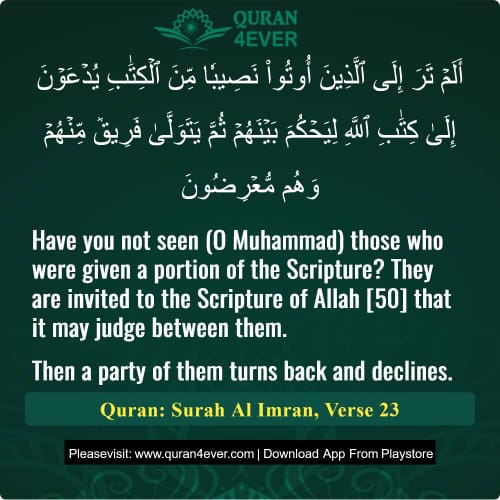
Transliteration:( Alam tara ilal lazeena ootoo naseebam minal Kitaabi yud'awna ilaa Kitaabil laahi liyahkuma bainahum summa yatawallaa fareequm minhum wa hum mu'ridoon )
"Have you not seen (O Muhammad) those who were given a portion of the Scripture? They are invited to the Scripture of Allah [50] that it may judge between them. Then a party of them turns back and declines."
This verse was revealed in two related contexts:
The Prophet ﷺ invited the Jews to Islam. When he said he followed the religion of Hazrat Ibrahim (AS), they falsely claimed Ibrahim was a Jew. The Prophet challenged them to bring the Tauraat, but they refused.
In another case, a Jewish nobleman committed adultery, and the Jews approached the Prophet ﷺ expecting a lenient ruling. However, the Prophet upheld the Torah’s law of stoning, exposing their dishonesty.
Ibn Soorya, a Jewish scholar, tried to hide the verse prescribing stoning by covering it with his finger. When Abdullah bin Salaam (RA) revealed it, both the scholar and the criminal were stoned. This incident prompted the revelation of this verse.
Here, “Scripture” refers to the Tauraat, and “a party” refers to the Jewish scholars who knowingly rejected its rulings.
23. Have you not seen those who have been given a portion of the Scripture They are being invited to the Book of Allah to settle their dispute, then a party of them turned away, and they are averse. 24. This is because they say: “The Fire shall not touch us but for a number of days.” And that which they used to invent in their religion has deceived them. 25. How (will it be) when We gather them together on the Day about which there is no doubt (i.e. the Day of Resurrection). And each person will be paid in full what he has earned And they will not be dealt with unjustly.
Allah criticizes the Jews and Christians who claim to follow their Books, the Tawrah and the Injil, because when they are called to refer to these Books where Allah commanded them to follow Muhammad , they turn away with aversion. This censure and criticism from Allah was all because of their defiance and rejection. Allah said next,
(This is because they say: “The Fire shall not touch us but for a number of days.”) meaning, what made them dare to challenge and defy the truth is their false claim that Allah will only punish them for seven days in the Fire, a day for every one thousand years in this life. We mentioned this subject in the Tafsir of Surat Al-Baqarah.
Allah then said,
(And that which they used to invent regarding their religion has deceived them.) meaning, what caused them to remain on their false creed is that they deceived themselves, believing that the Fire will only touch them for a few days for their errors. However, it is they who have invented this notion, and Allah did not grant them authority to support this claim. Allah said, while threatening and warning them,
(How (will it be) when We gather them together on the Day about which there is no doubt (i. e. the Day of Resurrection).) meaning, what will their condition be like after they have uttered this lie about Allah, rejected His Messengers and killed His Prophets and their scholars who enjoined righteousness and forbade evil Allah will ask them about all this and punish them for what they have done. This is why Allah said,
(How (will it be) when We gather them together on the Day about which there is no doubt.) meaning, there is no doubt that this Day will come,
(And each person will be paid in full what he has earned And they will not be dealt with unjustly.).
(3:23) Have you not noticed those who have been given a portion of the Book? Whenever their learned men are summoned to the Book of Allah to judge the differences between them,[22] a party of them turns away in aversion.
22. They are asked to acknowledge the Book of God as the final arbiter in all matters, and to submit to its judgement, accepting as right whatever this Book holds to be right, and as wrong whatever it holds to be wrong. The Book of God referred to here is the Torah and the Injil, while the expression ‘those who have been given a portion of the Book’ refers to the Jewish and Christian religious scholars. (For the Quranic view of the Torah and the Injil see n. 2 above – Ed.)
[120]- Referring to the Jews of Madīnah who refused to implement the rulings given by Allāh in the Torah or to acknowledge the Prophet (ﷺ), whose coming was mentioned therein.

For a faster and smoother experience,
install our mobile app now.
Related Ayat(Verses)/Topics